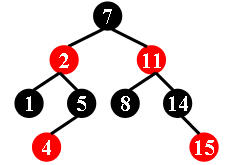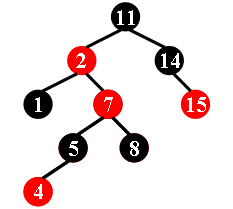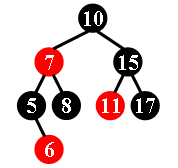PAT 1135 Is It A Red-Black Tree[难]
1135 Is It A Red-Black Tree (30 分)
There is a kind of balanced binary search tree named red-black tree in the data structure. It has the following 5 properties:
- (1) Every node is either red or black.
- (2) The root is black.
- (3) Every leaf (NULL) is black.
- (4) If a node is red, then both its children are black.
- (5) For each node, all simple paths from the node to descendant leaves contain the same number of black nodes.
For example, the tree in Figure 1 is a red-black tree, while the ones in Figure 2 and 3 are not.
 |  |  |
|---|---|---|
| Figure 1 | Figure 2 | Figure 3 |
For each given binary search tree, you are supposed to tell if it is a legal red-black tree.
Input Specification:
Each input file contains several test cases. The first line gives a positive integer K (≤30) which is the total number of cases. For each case, the first line gives a positive integer N (≤30), the total number of nodes in the binary tree. The second line gives the preorder traversal sequence of the tree. While all the keys in a tree are positive integers, we use negative signs to represent red nodes. All the numbers in a line are separated by a space. The sample input cases correspond to the trees shown in Figure 1, 2 and 3.
Output Specification:
For each test case, print in a line "Yes" if the given tree is a red-black tree, or "No" if not.
Sample Input:
3
9
7 -2 1 5 -4 -11 8 14 -15
9
11 -2 1 -7 5 -4 8 14 -15
8
10 -7 5 -6 8 15 -11 17
Sample Output:
Yes
No
No题目大意:给出了红黑树的定义,并且给出n组样例,并且每一组给除了先根遍历结果,判断每一组是否是红黑树,红色节点用负号表示。
//可以用先根遍历来确定一棵二叉树吗?
1.根节点是黑色
2.如果一个节点是黑色,那么子节点为红色
3.在所有从根节点到叶节点的路径上,黑色节点的个数相同。
红黑树也是一个二叉搜索树,所以能够根据前序来建树!!
代码转自:https://www.liuchuo.net/archives/4099
#include <iostream> #include <vector> #include <cmath> #include<cstdio> using namespace std; vector<int> arr; struct node { int val; struct node *left, *right; }; node* build(node *root, int v) { if(root == NULL) { root = new node(); root->val = v; root->left = root->right = NULL; } else if(abs(v) <= abs(root->val)) root->left = build(root->left, v);//递归建树!!! else root->right = build(root->right, v); return root; } bool judge1(node *root) { if (root == NULL) return true; if (root->val < 0) { //如果当前是红色节点,去判断左右子树是否是黑色节点。 if (root->left != NULL && root->left->val < 0) return false; if (root->right != NULL && root->right->val < 0) return false; } //再递归地去判断左子节点的子数,和右子节点的子数。 return judge1(root->left) && judge1(root->right); } int getNum(node *root) { if (root == NULL) return 0;//这里是返回个数0. int l = getNum(root->left); int r = getNum(root->right); return root->val > 0 ? max(l, r) + 1 : max(l, r); //如果根节点是黑节点,那么+1. } bool judge2(node *root) { if (root == NULL) return true; int l = getNum(root->left);//获取左右子树的黑节点个数。 int r = getNum(root->right); if(l != r) return false;//图三在根节点调用时在此处就会返回false。 return judge2(root->left) && judge2(root->right);//再去递归判断子树中是否符合, //像图二就会在这次递归中判断为false. } int main() { int k, n; scanf("%d", &k); for (int i = 0; i < k; i++) { scanf("%d", &n); arr.resize(n); node *root = NULL; for (int j = 0; j < n; j++) { scanf("%d", &arr[j]); root = build(root, arr[j]); } //如果根节点不是红色, if (arr[0] < 0 || judge1(root) == false || judge2(root) == false) printf("No\n"); else printf("Yes\n"); } return 0; }
//柳神真厉害。
1.二叉树这类问题都是使用递归去做的,掌握递归的思想十分重要。
2.根据条件去写出函数来判断。
3.要多复习。


 浙公网安备 33010602011771号
浙公网安备 33010602011771号